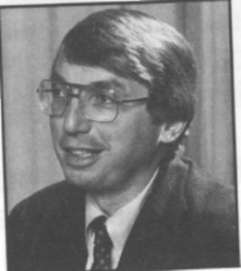 |
Home | Search | Browse | About IPO | Staff | Links |
 |
Home | Search | Browse | About IPO | Staff | Links |
|
Political potpourri  By PAUL M. GREEN Some thoughts and reflections about politics and other things. On the surface it may seem absurd but a strong case can be made that Chicago Mayor Harold Washington probably wishes his arch rival, former alderman Ed Vrdolyak, was back in the city council. The mayor's masterful ability to play "backboard politics" (bouncing and deflecting controversial governmental and political issues off somebody else by blaming them for any perceived failure on his part) has been hampered by Vrdolyak's absence. An eager and snarling Vrdolyak makes an excellent backboard for the mayor's reform rhetoric and rapier wit, much better than more distant targets like Gov. Jim Thompson and President Ronald Reagan. Without "Council Wars" the second Washington administration will be judged on its ability to govern and not on its ability to play politics. Another irony facing Chicago's mayor is the issue of race. Undeniably his color helped him attain his present position. Yet the same race issue which propelled him into office also curtails and limits his political and governmental flexibility. Mayor Washington and his city need a Democratic president elected in 1988. Like former Mayor Richard J. Daley, Washington would very much enjoy playing a pivotal and decisive role in the nominee selection process. Yet the candidacy of the Rev. Jesse Jackson narrows Washington's maneuverability. Jackson, though a major contender, is unlikely to win the nomination, let alone become the nation's first black president. If Washington had endorsed a more viable contender than Jackson, he might possibly have faced a short-run local firestorm, but in the long run it might have been the shrewdest move he could have made for himself and his city. On the urban economic front, much has been written about the downtown revitalization programs being pursued by Chicago and other older U.S. cities. Yet a recent study reveals that over 52 percent of U.S. aggregate income is now in suburbia. Major "downtown type" shopping for consumers with disposable income means going to a mall, not to a department store. This phenomenon stretches beyond urban-suburban rivalry to intra-city competition as well. Chicago's downtown department store giants — Marshall Field's and Carson Pirie Scott — together have more retail space than any regional shopping center in the nation. Yet in city sales performance, they are second to the smaller and classier north Michigan Avenue stores. On the Republican front, GOP Gov. Thompson and former Cook County Democratic party chairman Vrdolyak are making critical moves that they hope will enhance their future public careers. 38/October 1987/Illinois Issues Thompson has become a national leader in the president's campaign for U.S. Senate confirmation of U.S. Supreme Court nominee Judge Robert H. Bork. A few months ago, following his party's condemnation of his state tax hike plan, Thompson's conservative Republican credentials were zilch! By championing Bork, the governor has once again proven to be the Gale Sayers of Illinois politics — no one reverses his field faster or more easily than "Big Jim." Are Illinois and Chicago politics so The big question remaining is whether Thompson's latest political shift will make him acceptable as a vice presidential nominee to the likely conservative-dominated 1988 Republican convention in New Orleans. As of this writing (first week of September) Vrdolyak has not completed his expected move to the Republican party. For a man who is known as "Fast Eddie," he has taken a great deal of time making his shift. Is the Republican party ready and willing to accept the energetic, ambitious and controversial Vrdolyak, who could become a force in internal party politics? The GOP party and elected officials most enthusiastic about a Vrdolyak ''party jump'' do not live in Cook County. Closing questions: Are Illinois and Chicago politics so competitive and brutal that the political and economic cooperation needed to finance any new Windy City sports stadium may be impossible to achieve? Isn't it true that the quality of life in Chicago's public housing has continually deteriorated over the last 20 years, despite all the sanctimonious statements in the battle between the city and the U.S. Department of Housing and Urban Development for control of the Chicago Housing Authority? 39/October 1987/Illinois Issues |
|
|